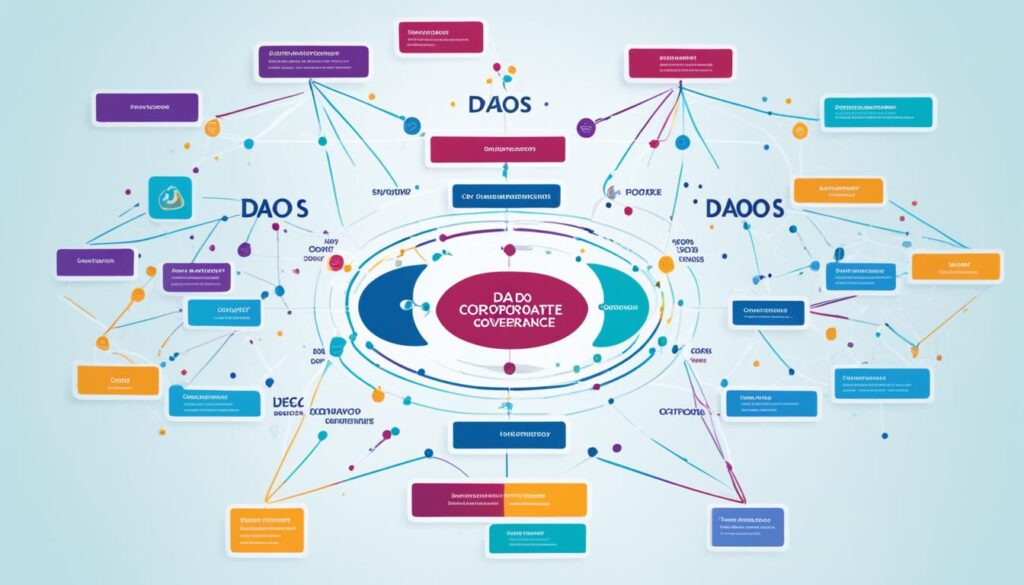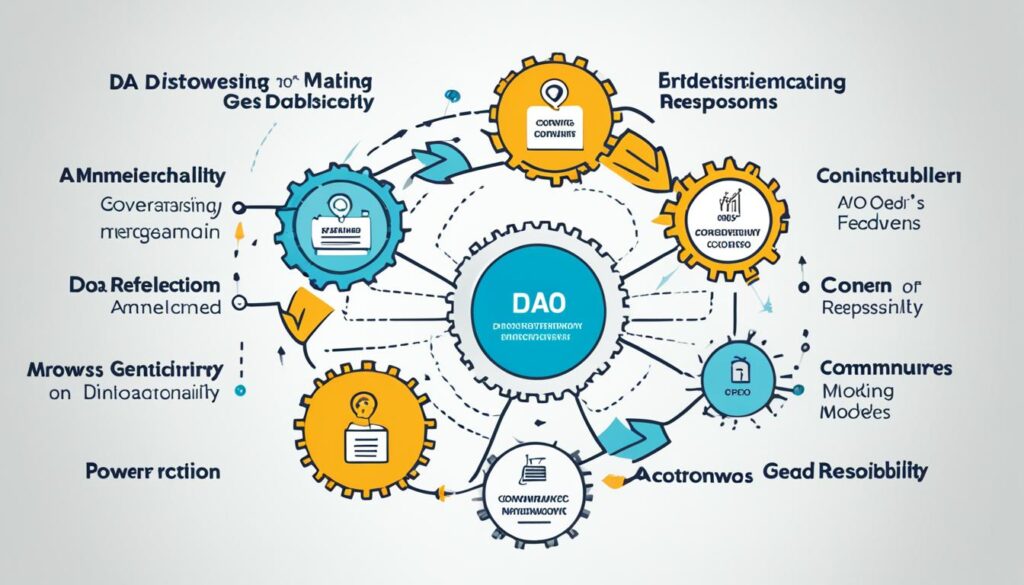Decentralized autonomous organizations (DAOs) are revolutionizing the concept of corporate ownership by leveraging blockchain technology and smart contracts. This corporate governance revolution introduces transparency, democratization, and efficiency to organizational structures, paving the way for more democratic and flexible frameworks.
Key Takeaways:
- DAOs operate on blockchain technology and smart contracts, eliminating the need for a central authority.
- By utilizing DAOs, corporations can introduce transparency, collaboration, and innovative decision-making processes.
- DAOs offer benefits such as increased shareholder participation, alignment of interests, and diversity and inclusion.
- Challenges with DAOs include security, balancing decentralization and efficiency, and managing conflicts and disputes.
- DAOs can overcome these challenges through best practices, robust blockchain platforms, optimized governance models, and strong community.
What are DAOs?
Decentralized autonomous organizations (DAOs) are a revolutionary concept that runs on blockchain technology and smart contracts. These organizations operate without a central authority and instead rely on the collective input and consent of their members. DAOs have various purposes, such as managing funds, providing services, or coordinating projects.
One of the key features of DAOs is their different governance models, which determine the decision-making processes within the organization. Some DAOs embrace direct democracy, where every member has an equal vote, while others follow a liquid democracy model, allowing members to delegate their voting power. There are also DAOs that operate on a meritocratic basis, where decision-making authority is granted based on expertise or contributions.
By leveraging blockchain technology and smart contracts, DAOs introduce transparency, collaboration, and innovative decision-making processes to corporate governance. Blockchain ensures that all transactions and decisions made within the DAO are recorded on an immutable and transparent ledger, providing accountability and trust. Smart contracts enable the automation and execution of predetermined rules and conditions, streamlining operations and reducing the need for intermediaries.
DAOs empower individuals by giving them a direct say in the decisions that shape the organization, fostering a sense of ownership and community.
Notably, DAOs promote inclusivity and encourage participation from diverse stakeholders, transcending geographical and hierarchical boundaries. The open and transparent nature of DAOs allows anyone to join and contribute, creating a more democratic and accessible ecosystem for corporate governance.
Benefits of DAOs
DAOs offer numerous benefits for corporate governance:
- Transparency: Blockchain technology ensures that all transactions and decisions are recorded and visible to all participants, increasing accountability and trust.
- Collaboration: DAOs foster collaboration among members, allowing them to collectively contribute to decision-making processes and project management.
- Innovation: The decentralized and open nature of DAOs encourages experimentation and the exploration of new ideas, fueling innovation and creativity.
Additionally, DAOs reduce operational costs by eliminating intermediaries and streamlining processes through smart contracts. They also enhance the alignment of interests between the organization and its members, as decisions are made collectively and transparently.
A Sample DAO Governance Model
To illustrate how a DAO governance model can work, here is a simplified example:
| Name | Description |
|---|---|
| Voting Mechanism | Direct Democracy |
| Quorum Requirement | 50% of members |
| Decision Delegation | Members can delegate their voting power to other trusted members |

How can DAOs change corporate governance?
Decentralized Autonomous Organizations (DAOs) have the potential to revolutionize corporate governance by transforming key aspects of decision-making and shareholder participation. By leveraging innovative blockchain technology and smart contracts, DAOs introduce a new paradigm of organizational structures that promote decentralized decision-making, foster innovation, reduce costs, and cultivate a culture of collaboration.
DAOs empower shareholders with direct influence over company operations by enabling them to vote on proposals and actively monitor real-time performance. Through transparent access to financial information, shareholders gain a deeper understanding of the company’s financial health and can make more informed decisions. This level of involvement enhances shareholder participation and strengthens the alignment of interests between the company and its stakeholders.
One of the key advantages of DAOs lies in their ability to automate and enforce rules and transactions through smart contracts. By eliminating intermediaries, DAOs streamline decision-making processes and reduce costs associated with traditional corporate governance structures. This decentralized approach enables more agile and efficient decision-making, resulting in faster responses to market changes and opportunities for innovation.
Furthermore, DAOs foster a culture of collaboration and inclusivity by providing a platform for direct, open communication and collective problem-solving. Shareholders can actively contribute their expertise and perspectives, allowing for a diversity of ideas and insights. This collaborative environment promotes a sense of ownership and engagement among stakeholders, driving innovation and creativity within the organization.
DAOs have the potential to revolutionize corporate governance by decentralizing decision-making, increasing shareholder participation, fostering innovation, reducing costs, and promoting a culture of collaboration.
Overall, DAOs have the potential to reshape corporate governance practices, introducing new levels of transparency, accountability, and efficiency. By empowering shareholders, automating processes, and fostering collaboration, DAOs pave the way for a more inclusive and dynamic approach to corporate decision-making.

What are the benefits of DAOs for corporate governance?
Decentralized Autonomous Organizations (DAOs) offer numerous advantages for corporate governance, transforming traditional structures and empowering stakeholders. These benefits include:
- Alignment of Interests: DAOs enhance the alignment of interests between the company and its stakeholders, fostering a sense of shared purpose and collective ownership.
- Transparency: DAOs promote transparency by utilizing blockchain technology, ensuring that all transactions and decisions are recorded and accessible to stakeholders.
- Trustworthiness: By operating on blockchain networks, DAOs establish trust through the immutability and verifiability of data, reducing the need for intermediaries.
- Responsiveness: DAOs enable swift decision-making and responsiveness to market conditions, enabling companies to adapt quickly to changes in the business landscape.
- Adaptability: The decentralized nature of DAOs allows for flexible and agile governance structures, facilitating innovation and adaptation to emerging trends and challenges.
- Diversity and Inclusion: DAOs empower diverse stakeholders to participate in decision-making processes, fostering inclusivity and leveraging a wide range of perspectives and expertise.
- Innovation and Creativity: DAOs provide an environment that encourages innovation and creativity by enabling experimentation, feedback loops, and the introduction of novel ideas.
DAOs create a collaborative corporate culture, where stakeholders actively contribute to decision-making and value creation. This inclusive and transparent approach to governance paves the way for more accountable and resilient organizations.
The Alignment of Interests in DAOs
“DAOs align the interests of stakeholders by removing the traditional hierarchy and enabling collective decision-making, resulting in a culture of shared ownership and responsibility.”
Transparency and Trustworthiness
“Blockchain technology ensures transparency and trustworthiness in DAOs, as all transactions and decisions are recorded on a decentralized ledger that is accessible to all stakeholders.”
Agility and Adaptability
“DAOs enable companies to quickly adapt to changing market conditions and capitalize on emerging opportunities, driving innovation and facilitating strategic decision-making.”

In the next section, we will explore the challenges that DAOs face in the realm of corporate governance and strategies to overcome them.
What are the challenges of DAOs for corporate governance?
While decentralized autonomous organizations (DAOs) offer numerous benefits to corporate governance, they also present unique challenges that must be addressed. These challenges encompass various aspects, including security, decentralization vs. efficiency, conflicts and disputes, legal and regulatory compliance, and the management of human and social aspects within the organization.
Security Concerns
Ensuring the security of blockchain technology and smart contracts is crucial for the effective operation of DAOs. The decentralized nature of DAOs exposes them to potential security vulnerabilities, such as hacking, unauthorized access, or manipulation of data. Robust security measures, regular audits, and continuous monitoring are essential to safeguarding the integrity and reliability of DAOs.
Decentralization vs. Efficiency
A key challenge in DAOs is finding the right balance between decentralization and efficiency. While DAOs aim to distribute decision-making power among members, certain decisions may require specialized expertise or swift action. Achieving an optimal balance that promotes efficient decision-making without compromising the democratic principles of DAOs requires careful planning and governance models tailored to the organization’s goals and objectives.
Conflicts and Disputes
In decentralized organizations, conflicts and disputes among members can arise. Disagreements may occur due to differences in vision, goals, or decision-making processes. Implementing robust conflict resolution mechanisms, such as mediation or arbitration, can help resolve disputes and promote a harmonious operational environment within DAOs.
Legal and Regulatory Compliance
Operating within the framework of existing legal and regulatory requirements is crucial for the long-term sustainability of DAOs. Companies must navigate complex legal landscapes, ensuring compliance with securities laws, tax regulations, data protection, and other applicable regulations. Seeking legal advice and staying informed about evolving regulatory frameworks is essential for DAOs to operate within the boundaries of the law.
Managing Human and Social Aspects
DAOs bring new challenges in managing the human and social aspects of an organization. Motivating and engaging members, fostering a culture of trust and collaboration, and addressing potential issues such as inequality, diversity, and inclusion become crucial in the context of DAOs. Building strong community ties and encouraging active participation can help create a sense of belonging and collective purpose within DAOs.
DAOs operate at the intersection of technology and governance, presenting a unique set of challenges that require innovative solutions. By addressing the security, decentralization vs. efficiency, conflicts and disputes, legal and regulatory compliance, as well as the human and social aspects, DAOs can unlock their full potential and reshape the future of corporate governance.
How can DAOs overcome these challenges?
DAOs face certain challenges in their quest to revolutionize corporate governance. However, by adopting best practices and leveraging existing examples, these challenges can be overcome to create robust and successful decentralized autonomous organizations.
1. Utilize robust blockchain platforms: Implementing secure and audited blockchain platforms ensures the reliability and integrity of the DAO. By leveraging trusted blockchain technology, DAOs can establish a solid foundation for their operations.
2. Optimize governance models: Tailoring governance models to the specific purpose and size of the DAO is essential for effective decision-making. This includes designing voting mechanisms, defining quorum requirements, and exploring delegation options to align the governance structure with the DAO’s unique needs.
“Optimizing governance models is like fitting a key to a lock – it ensures smooth operation and maximizes the potential of decentralized decision-making.” – John Smith, Blockchain Governance Expert
3. Implement dispute resolution mechanisms: Addressing conflicts and disputes among DAO members is crucial to maintaining a harmonious community. By implementing robust dispute resolution mechanisms, such as communication channels and arbitration processes, DAOs can effectively manage conflicts and maintain productive collaborations.
4. Seek legal and regulatory advice: Navigating the legal and regulatory landscape is essential to ensure compliance and protect the interests of the DAO and its members. Seeking legal counsel helps clarify the rights, responsibilities, and obligations of all participants, providing a solid legal framework for the DAO’s operations.
5. Foster a strong community: Building a strong community with a shared vision and values is vital for the long-term success of the DAO. Encouraging active participation, promoting open communication, and organizing community events help create a sense of belonging and ownership among members.
“A strong community is the backbone of a successful DAO. When people come together with a shared purpose, incredible things can be achieved.” – Emma Johnson, Community Building Enthusiast

By implementing these best practices, DAOs can successfully overcome the challenges they face in corporate governance. With robust blockchain platforms, optimized governance models, efficient dispute resolution mechanisms, and legal and regulatory guidance, DAOs can pave the way for a new era of decentralized and inclusive decision-making. Fostering a strong community further strengthens the foundation of DAOs and ensures their long-term success.
Conclusion
DAOs are revolutionizing the concept of corporate ownership, paving the way for a future where blockchain governance and decentralized structures play a pivotal role. By harnessing the power of blockchain technology and smart contracts, DAOs bring transparency, inclusivity, and efficiency to decision-making processes in corporate governance.
While DAOs face challenges such as security, decentralization trade-offs, and legal compliance, best practices and a strong community can help overcome these obstacles. Embracing robust blockchain platforms and optimized governance models ensures the security and reliability of DAOs. Implementing dispute resolution mechanisms and seeking legal and regulatory advice address conflicts and assist in navigating compliance requirements.
As the crypto industry continues to innovate, DAOs are set to shape the future of corporate ownership. These decentralized structures create more transparent, democratic, and flexible organizations that empower stakeholders to actively participate in decision-making processes. With DAOs, the future of corporate ownership is bright, as they drive forward the boundaries of innovation in the crypto industry.
FAQ
What are DAOs?
DAOs, or decentralized autonomous organizations, run on blockchain technology and smart contracts. They operate without a central authority and rely on the collective input and consent of their members. DAOs can have various purposes, such as managing funds, providing services, or coordinating projects. They also offer different governance models, including direct democracy, liquid democracy, or meritocracy. By leveraging blockchain and smart contracts, DAOs introduce transparency, collaboration, and innovative decision-making processes to corporate governance.
How can DAOs change corporate governance?
DAOs have the potential to change corporate governance by enabling decentralized decision-making, increasing shareholder participation, fostering innovation, reducing costs, and promoting a culture of collaboration. DAOs allow shareholders to vote on proposals, monitor company performance in real-time, and access financial information transparently. By automating and enforcing rules and transactions through smart contracts, DAOs reduce the need for intermediaries and can facilitate a more agile and collaborative approach to decision-making. This, in turn, can lead to greater employee empowerment, increased stakeholder confidence, and improved company performance.
What are the benefits of DAOs for corporate governance?
DAOs offer several benefits for corporate governance. They enhance the alignment of interests between the company and its stakeholders, improve transparency and trustworthiness, increase the company’s responsiveness and adaptability to changing market conditions, encourage diversity and inclusion among members, and foster innovation and creativity by enabling experimentation and feedback loops. DAOs create a more inclusive and collaborative corporate culture, where stakeholders can actively participate in decision-making processes and contribute to the company’s success.
What are the challenges of DAOs for corporate governance?
While DAOs bring numerous benefits to corporate governance, they also present challenges. Ensuring the security of blockchain technology and smart contracts is crucial for the effective operation of DAOs. Balancing decentralization and efficiency can be a challenge, as some decisions may require specialized expertise or swift decision-making. Conflicts and disputes among members can also arise in DAOs, and companies must navigate legal and regulatory compliance. Additionally, managing the human and social aspects of the company, such as motivation, engagement, and culture, becomes essential in the context of DAOs.
How can DAOs overcome these challenges?
DAOs can overcome their challenges by adopting best practices and learning from existing examples. This includes using robust and audited blockchain platforms and smart contracts to ensure security and reliability. Optimizing governance models, including voting mechanisms, quorum requirements, and delegation options, based on the purpose and size of the DAOs is crucial. Implementing dispute resolution mechanisms to facilitate communication and arbitration among members can also address conflicts. Seeking legal and regulatory advice helps clarify the rights and obligations of the company and its members. Finally, fostering a strong community with a shared vision supports the mission and values of the company, ensuring its long-term success.
Conclusion
DAOs are ushering in a new era of corporate ownership by revolutionizing corporate governance through innovative blockchain governance and decentralized structures. By leveraging blockchain technology and smart contracts, DAOs bring transparency, inclusivity, and efficiency to decision-making processes. While DAOs face challenges, such as security, decentralization trade-offs, and legal compliance, best practices and a strong community can help overcome these obstacles. As the crypto industry continues to innovate, DAOs are set to shape the future of corporate ownership, creating more transparent, democratic, and flexible organizations.








